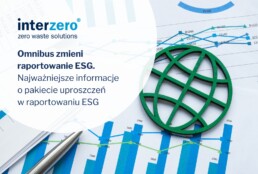
Omnibus will change ESG reporting. Highlights of the ESG reporting simplification package
26 February 2025. The European Commission has unveiled its announced sustainability simplification package. Omnibus I is the first of the expected packages, which aim to increase the competitiveness and investment attractiveness of EU companies.
Omnibus Simplification Package I - Basic assumptions
Omnibus I is a package of proposals aimed at simplifying EU legislation, increasing the attractiveness of EU businesses and unlocking additional investment opportunities. According to EC estimates, it will result in 25% reduction in administrative burden for those required to report on sustainability, with the burden to be reduced by as much as 35% in the SME sector.
The changes outlined in the Omnibus I package will mainly concern:
- sustainable finance reporting,
- due diligence on sustainability reporting,
- EU taxonomy,
- Carbon Boundary Adjustment Mechanism (CBAM),
- European investment programmes.
According to the EC's calculations, the implementation of the announced proposals will yield savings of EUR 6.3 billion and will result in an increase in private and public investment of €50 billion. As announced by the head of the EC, Ursula von der Leyen, further simplifications are already' on the way'.
Omnibus I will postpone mandatory ESG reporting and ease the burden on SMEs
The simplification package adopted by the EC implies several key changes:
- Postpone by two years (to 2028) the reporting requirements for companies currently covered by the CSRD, which are obliged to report from 2026 or 2027.
- By 80%, the number of entities covered by the sustainability reporting obligation will be reduced.
- Sustainability reporting will mandatory only for large entities with more than 1,000 employees and a balance sheet total of more than EUR 25 million or net revenue of more than EUR 50 million.
- By limiting the information reported in the value chain, the ESG reporting requirements imposed on the largest companies will not burden small entities.
Reducing the burden on SMEs also involves on reducing the frequency of periodic evaluations and monitoring partners from annual to five-year intervals. However, if there is a legitimate need, the ESG reporting entity will be able to perform an ad hoc assessment.
Importantly, Omnibus I upholds the possibility of voluntary ESG reporting for entities that will in future fall within the scope of the CSRD. In this way, the EC wants to ensure that companies have access to sustainable financing, the obtaining of which in many cases involves non-financial reporting.
Reduction and simplification as key tenets of the Omnibus I package
In addition to narrowing the range of entities covered by the effects of the CSRD, the European Commission also intends to reduce the costs associated with the preparation of ESG reports. Omnibus I promises businesses a reduction in the expense of attesting ESG reporting. This is all thanks to waiving attestation at a sufficient level of assurance (reasonable assurance.) Instead, only limited assurance will be required.
The Omnibus package also included information on the simplification of ESRS standards by reduction of ESG disclosures. Furthermore, the EC announced that so-called sectoral standards, i.e. sets of guidelines taking into account the specificities of individual industries, will also not be adopted. Entrepreneurs will also gain the possibility to report on activities that are partly in line with the EU taxonomy. This approach is intended to support a gradual transformation towards sustainability.
What else will change with the introduction of the Omnibus?
- There will be a substantial simplification of reporting templates. Omnibus I announces a reduction in their number by as much as 70%.
- Small importers will be excluded from the CBAM (so-called carbon tax) mechanism and the obligation of quarterly reporting. For other importers, the mechanism will be simplified.
EU sets course for competitiveness and climate goals
The Omnibus I simplification package proposed by the EC constitutes a sort of trade-off between climate and economic objectiveswhich the Community intends to achieve. The loosening of reporting rigour and climate policy is a response to the current economic and political situation, which requires the creation of conditions for more dynamic economic development. The proposed direction of change is likely to result in creating a more business-friendly environment which will help businesses in the EU to grow, innovate and create more jobs.
A series of simplifications and reliefs are also followed by financial incentives. The Commission has proposed a series of amendments aimed at enabling greater use of EU investment programmes InvestEU and EFIS, among others. It is expected to mobilise around EUR 50 billion in additional public and private investment, make it easier for Member States to support innovative companies and simplify administrative requirements, which have hitherto been a heavy burden on the SME sector in particular.
The detailed scope of the Omnibus I package can be found in on the European Commission website (eng.).